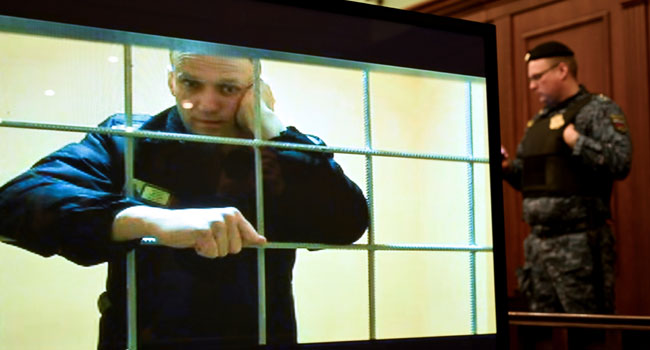Navalny sent to remote prison camp by Kremlin, ally reports
Jailed Russian opposition leader Alexei Navalny has been moved to a remote penal colony in the Arctic region, his allies said on Monday, sparking new concerns for his health and safety.
Navalny, who survived a poisoning attack last year that he blamed on the Kremlin, was sentenced to 19 years in prison in February on charges of extremism. He was then transferred from a jail near Moscow to an unknown location, prompting his supporters to launch a frantic search for him.
On Monday, his spokeswoman Kira Yarmysh announced on Twitter that they had finally located Navalny at the IK-3 colony in the village of Kharp, in the Yamalo-Nenets Autonomous District, more than 2,000 kilometres (1,240 miles) northeast of Moscow.
“His lawyer visited him today. Alexei is doing well,” Yarmysh wrote.
But Ivan Zhdanov, the head of Navalny’s Anti-Corruption Foundation, said the colony was “one of the most northern and remote” in Russia, with harsh conditions and limited communication with the outside world.
“It is a special regime colony, usually reserved for particularly dangerous prisoners,” Zhdanov said in a video message.
He added that Navalny could be moved again to a nearby colony, No.18, nicknamed “Polar Owl”, which has an even stricter regime.
The transfer of Navalny to the Arctic region comes three months before a presidential election in Russia, in which President Vladimir Putin is widely expected to win a fifth term.
Navalny, who is Putin’s most prominent critic, has been barred from running in the vote, and his movement has faced a relentless crackdown by the authorities.
Last year, Navalny was poisoned with a nerve agent while on a flight from Siberia to Moscow. He was flown to Germany for treatment, where he recovered and accused Putin of ordering the attack. The Kremlin has denied any involvement.
In January, Navalny returned to Russia, where he was arrested and jailed. He then launched a series of mass protests across the country, demanding his release and denouncing Putin’s rule.
The rallies were met with a violent police response, and thousands of people were detained. Many of Navalny’s allies and associates were also arrested or forced to leave the country.
Among them was Maria Pevchikh, who runs the Anti-Corruption Foundation from abroad and was targeted by a Russian arrest warrant last week.
Navalny’s supporters have expressed fears for his health and safety in prison, especially after his poisoning. They have also accused the authorities of trying to isolate him from the public and prevent him from influencing the political situation in Russia.
“The goal is clear: to isolate Alexei, especially before the elections,” Zhdanov said.
The United States and the European Union have condemned Navalny’s imprisonment and called for his immediate release. They have also imposed sanctions on several Russian officials and entities over his poisoning and detention.
Russia has rejected the Western pressure and accused them of meddling in its internal affairs.
AFP
